David Mamet is an American playwright and director, most known for his Pulitzer Prize-winning drama, Glengarry Glen Ross.
With 9 awards under his belt, David is considered one of America’s most successful modern playwrights. So the David Mamet MasterClass gives you a chance to learn dramatic writing from one of the best writers of our times.
Before we get to the more detailed David Mamet MasterClass Review, here is a summary of the key points:
.
Quick summary
Learn how to:
- Write to the rules of drama (including the “Three-Act Structure”)
- Engage your audience from the beginning through to the end
- Structure your plot to create a compelling and navigable journey
- Write the best dialogue for your actors and your audience
Pros
- Learn from an accomplished playwright
- In-depth teaching and engaging delivery style
- Extensive further reading and viewing
Cons
- Mostly play-specific
- Heavily anecdotal with fewer visual examples
- More theory than practice
Course length: 26 lessons, 4hr 51m.
Best for: Those interested in writing plays (especially drama and tragedy).
Overall: An interesting and engaging food-for-thought course teaching the ancient rules of drama and narrative in great detail. I learned a lot about dramatic writing and the lessons gave a keen insight into how David creates each aspect of drama (view details).
Now for the detail, here’s what I’ll be covering:
- About David Mamet and MasterClass
- Inside David Mamet’s MasterClass
- What I liked about the class and what could be improved
- Who this course is for, alternatives, and course uniqueness
- What others have said
- Verdict: Is the David Mamet MasterClass worth it?
So, let’s begin.
About David Mamet
David Mamet is a renowned playwright, screenwriter, and director.
Since founding the Atlantic Theater Company with actor William H. Macy in 1985, David has been heavily involved in New York’s Off-Broadway theater scene. He was admitted into the American Theater Hall of Fame in 2002 and has won an array of awards in both playwriting and screenwriting.
In 1984, he won the Pulitzer Prize for Drama with Glengarry Glen Ross. He also won the Los Charales award at the Ajijic International Film Festival for The Winslow Boy.
If you’re keen to expand your dramatic writing skills, David Mamet’s MasterClass is a must-watch.
And if you haven't seen the trailer I highly recommend you check it out::
About MasterClass
“Learn from the best.”
MasterClass is an educational online platform founded in 2015. Since its inception it has soared in popularity, with 80+ video lessons taught by renowned experts in their fields.
Unlike other online resources, which, if you’re lucky, are taught by academics, MasterClass gives you the chance to learn from those who have achieved worldwide fame by dint of their talent. These include Gordon Ramsay teaching cooking, Anna Wintour teaching leadership, and even Tony Hawk teaching skateboarding.
Along with its teaching excellence, MasterClass is known for its high production videos. It comes with a range of perks, including a Community Hub, Class Workbook, and even Q&A sessions with the teachers themselves.
That being said, MasterClass might not be for everyone. In this review, I hope to cover both the pros and cons of the platform to help you decide whether this is the course for you.
Inside David Mamet’s MasterClass
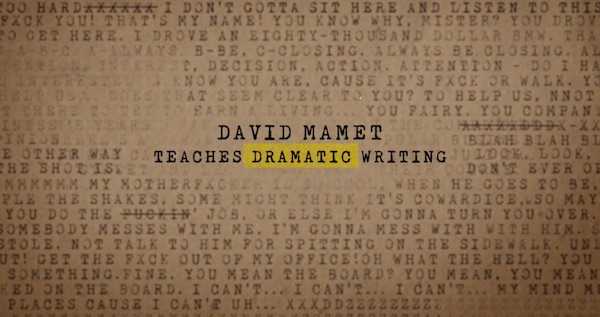
David Mamet’s MasterClass comprises 26 lessons, each at an average of 10 minutes in length. This adds up to a viewing time just shy of 5 hours.
Along with a comment section under each video, there is also a Community Forum and a 59-page Class Workbook. After a short introduction the course continues as follows:
Lesson 2 & 3: The Purpose of Drama
“Drama has rules. We’re given a premise. The hero wants something.”
At the beginning of his MasterClass, David introduces a lot of heavy theory but is quick to distil this information in an easy-to-digest way.
Similarly to Aaron Sorkin’s MasterClass, David emphasizes the dramatist’s need to understand cause and effect, dramatic plot, and Aristotle’s rules of drama. He also draws from his own book, Three Uses of the Knife, to expand on drama as a “relieving of consciousness.”
This section was valuable for getting into the right mindset for the rest of the course.
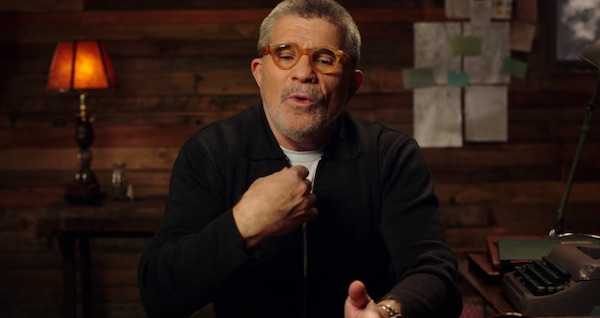
Lesson 4 & 5: Dramatic Rules
“Drama is an exercise in failure, and is also an exercise in lies.”
From my experience of online writing classes, it’s common for a teacher to spend the beginning discussing “ideas.” David’s MasterClass deviates from this, and he instead begins by laying down some theory as the bedrock of dramatic writing.
In this lesson, he teaches us the following:
- How to create a story (and at which point it begins)
- Aristotle’s rules for the dramatic plot and hero
- What all drama is ultimately about
- How the writer must work to get the audience’s attention
- Aristotle’s Three Unities
David pinpoints a lot of specifics when it comes to understanding the rules of a story. He also provides examples from the work of others. This was an interesting way of putting the lesson within a larger debate rather than its own small bubble.
Along with this, David uses this 2-part lesson to elaborate on how a scene works within a larger narrative. In particular, he explains how the 3-act structure of ancient drama works to best tell a story and provides some quick quick-fire tips that can help us along the way.
David’s teaching in these early lessons is remarkably varied, and he uses a range of analogies to shed light on some otherwise complex theories. The further reading, as well as the Workbook’s assignments, were also a nice way of getting us to put David’s theories into practice.
Lesson 6: Story Ideas and Inspiration
“Drama is just like analyzing a dream.”
Here, David shares with us his own idea-finding process, including the intriguing and surprising inspirations for the plays, American Buffalo, Sexual Perversity in Chicago, and Oleanna.
Interestingly, David is adamantly dismissive of themes. As he later tells us, “plot is all that there is.” Because of this, he prompts us to reconsider how we could frame a story away from the confines of themes.
He also gives us some questions we should ask ourselves when writing a story in order to better get to the meat of an idea – telling us, “the truth’s going to be where you didn’t expect it.”
Lesson 7: The Truth About Character
“All we know about a person’s character is what they do.”
David has a different approach to character. He discusses character in relation to action and dialogue, suggesting at what point a character exists and how they are defined through the story.
By the end of this lesson, you’ll likely change your opinion about how characters work within a plot and that widely-held wisdom could be incorrect.
David does a good job at sharing expertise and quotes from other successful playwrights (and even experts in other fields). I found this a nice way of getting a more rounded understanding of each topic. He also often reframes his arguments to ensure we understand them.
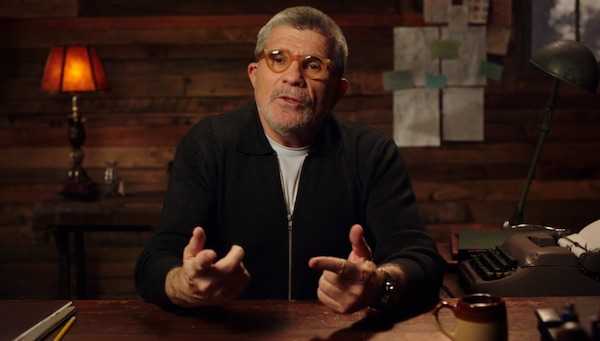
David expands on his early lessons to teach us Aristotle’s definition of character. He condenses the theory for a modern audience, breaking down Aristotle’s character rules and explaining them in the light of our contemporary age.
This was a good lesson in teaching us to keep our writing simple and concise, and applies to the further lessons in scene-writing and narrative.
Lessons 8-10: Plot Is All That There Is
“This is something that can’t be taught but must be learned.”
David tells a lot of anecdotes and jokes throughout this class, and he often uses them to frame each chapter. Here, he compares plot-writing to joke-telling, with an emphasis on the need for a strong punchline that is “simple, yet inevitable.”
As with character-writing, he tells us straight away what we need to take out of our final drafts. This includes everything that doesn’t “tend toward the punchline.” He also considers the importance of precipitating events and the 3-act structure, delving into what each scene and act should achieve.
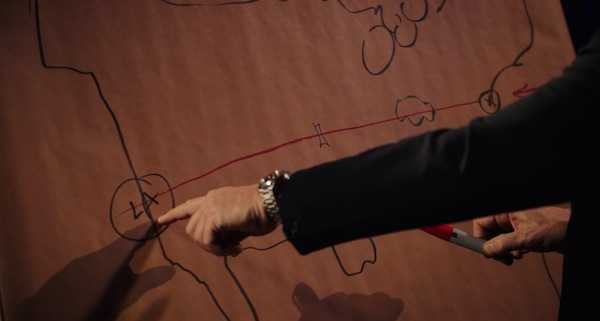
He also addresses the following points:
- How to overcome the “Second-Act Crisis”
- What we must put into a plot to make it successful
- The commonalities all (good) plots share
- How to establish and work through a main problem
This section was particularly compelling as it showed David at his noteboard with pen in hand. He takes us through a plot template, charting the progression of a narrative “from A to B.”
For visual learners, this chapter was notably engaging and was a change from simply listening to David’s theories.
Lesson 11 & 12: Case Studies
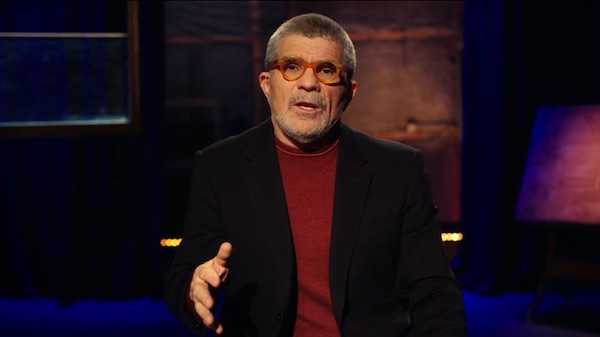
“Take the first ten minutes of any movie – take it out.”
David shares with us two case studies on structuring plot: American Buffalo and Glengarry Glen Ross. He gives us some tips on how to avoid a predictable opening and how to write in a way that captivates audiences from the get-go.
In these two chapters, we learn how to do the following:
- Subvert predictable openings
- Begin our work in medias res
- Distinguish between tragedy and drama
- Understand why works are structured in certain ways
- Identify the ways in which the audience thinks and reacts when watching a play
By using his two most famous plays as examples, this section is more suited to those interested in play-writing. While David discusses some universally-applicable theory, he does focus on dramatic writing and even the physicalities of moving actors around the stage.
I liked that David tied this chapter in with how the audience relates to plot structure. Rather than simply taking us through how a plot works, he always brings this to bear on what the audience will experience in the final showing.
This was a nice way of looking at how a play works and was a strong reminder to keep the end-vision in mind when writing for performance.
Lesson 13 & 14: Creating Rhythmic Dialogue
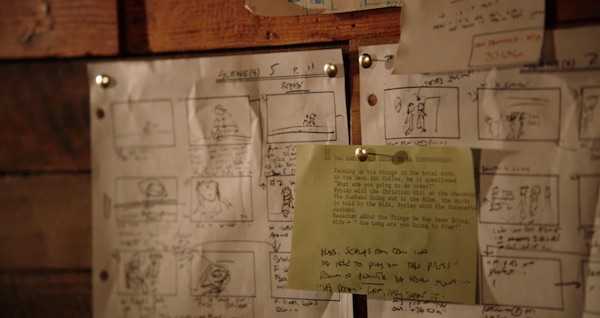
“Dialogue comes from what the character wants.”
As someone clearly dedicated to the classics, David begins this section with an emphasis on writing rhythmically with reference to Shakespeare.
David teaches us how to use rhythmic writing to imitate everyday speech and gives us some examples of good and bad dialogue for comparison.
For David, writing dialogue is akin to writing poetry; both have the power to elicit emotion. A lot of David’s examples revolve around Jewish traditions and religious texts. These might not hit home for everybody but it was definitely a refreshing way to consider how upbringing can influence dialogue.
David ends with a brief list of writers who excel in writing dialogue, and encourages us to read them critically to improve our writing for ourselves.
Lesson 15: Narrative & Exposition
“It’s not my job to be informative. It’s my job to be interesting.”
In this section, David shares some pointers about what to include (and exclude) from our narratives. He begins by citing the tradition of silent films and how their use of “titles and gags” have come to influence modern writing.
He argues that most information given in films is unimportant to the audience, and that our job is to entertain rather than to educate. In fact, he gives an example of how he dismissed the need for exposition in his first movie, House of Games, and the conflict this caused.
His main focus is on honing in the narrative and cutting out the “excess flesh.” He advises us on the following:
- Narration for film/plays vs. television
- How and when to fix narration problems
- What practices we can use to better understand movies
- The importance of cutting
- How to involve your audience in the editing process
While many wouldn’t agree with everything David teaches, he does give some valuable tips on how to cut our work to ensure that only the best stays in it.
Lesson 16: Scenes as Incidents
“If you took it out, would the audience miss it?”
Following on from the cutting of narration and exposition, David again pinpoints the audience as our key point of consideration when editing and cutting scenes. He argues that every scene (or incident) must answer three questions. If it doesn’t, it needs to be cut.
This is a no-nonsense way of approaching scene-cutting, which David admits is one of his favourite things to do. He references One Day in September as an example of successful scene-cutting and narration.
Overall, David is upfront about what an audience does and doesn’t want to see. He also encourages us to go with our gut instinct, cutting whatever doesn’t feel right.
Lessons 17 & 18: Writing Process
“There is no good place to start, so just jump in.”
In this section, David delves into the physicalities of writing. He tells us what materials he uses, what he doesn’t think is helpful, and how to fit writing into our day. Along with sharing his own experience, he also relates other writers’ processes and theories.
He also shares some valuable insight into how he overcomes writers’ block and “gets out” bad ideas.
His key takeaways are on how to come up with an outline; the 15-line rule; and the 3-minute pitch. For me, these were the most concrete tips on how to incorporate writing into our daily lives and how to exercise discipline.
Lesson 19: The Audience
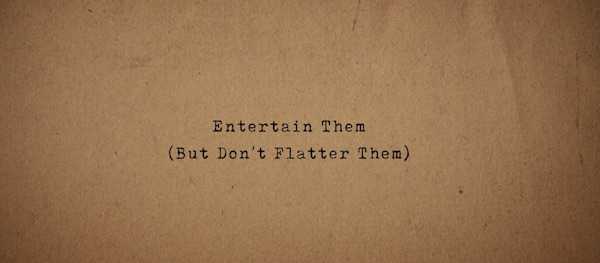
“They’re going to beat you to the punchline if you let them.”
Here, David shows us how to write with our audiences in mind and how dramatic writing, for them, exists in a “third category” outside of truth/falsehood (a theory he elaborates on in the next chapter).
David differentiates between the individual and collective audience and how they work in unison to give a work meaning. He tells us what we should and shouldn’t give to an audience and how this relates to their free-will when reading a work.
While a lot of this teaching is quite philosophical, there are also some clearly summarised tips that distil the complicated anecdotes. This includes how to create a bond of mutual respect with your audience and to encourage them to suspend their disbelief.
Lesson 20 &21: Lies & Truth
“All drama is about something which is hidden.”
Here, David extends his theories on truths and lies to teach us how to best serve our audience. As he sees it, finding and telling “the truth” is of chief importance, and it’s what the audience comes to hear.
Of all the sections in this MasterClass, I found this the hardest to follow. That being said, he provides some interesting discussions about the concept of “untruth” and how it exists in our daily lives.
David argues on the following points:
- The importance of truth-telling in drama
- How drama helps us to find the truth
- The difference between lies and untruths
- What the audience wants to take away from your work
Lesson 22 & 23: Actors and Acting Techniques
“If acting is not fun, why would you do it?”
Towards the end of the course, David gives some attention to acting techniques. As a mainly theoretical chapter, David offers us some further reading and relates his own background in acting.
He posits a crucial question: “What works?” and spends the chapter considering the answers to this. His focus is on what an actor can and must do, and how we should bear this in mind when casting.
Finally, David addresses the dramatist’s relationship with the actor and how this is vital for building trust that results in great performances. He gives some examples of actors who particularly succeed at this and how they work to portray character.
Lessons 24 – 26: Life of a Dramatist
“You’ve got to do one thing for your art and one thing for your business every day.”
David leaves us with some parting advice on how to achieve our writing goals. This includes our need to embrace bad writing and to cope with uncertainty. He also advises us on how to do the following:
- Become dedicated to our craft
- Inhabit the best state of mind for writing
- Stay actively learning and working
- Meet our goals every day
His final words are hugely motivational and are helpful life advice for any audience. He uses the analogy of the school vs. the garage to illustrate how we can create a positive working environment. As I’ll later show, this was a highlight of the course for many and definitely ended the MasterClass on an inspiring note.
My Experience of David Mamet’s MasterClass
Overall, there was a lot I enjoyed about David Mamet’s MasterClass. However, I don’t think this course is for everyone. I hope to cover the pros and cons to help you decide whether this MasterClass is for you.
It’s worth considering all aspects of this review before choosing to commit to the course.
What I Liked About David Mamet’s MasterClass
Learn from an Accomplished Playwright
As a multi-award winning writer and director, David Mamet has been the name on many people’s lips both in and outside of MasterClass. In his own course, Aaron Sorkin even cited him as one of his favourite writers, with American Buffalo being an excellent study in successful playwriting.
In this MasterClass, you get the unique opportunity to study under David himself. His approach is personable and is likely the closest most of us will get to learning from him face-to-face. It’s also worth noting that as an occasional guest lecturer, David has some experience with teaching to an audience.
Along with the teaching excellence, MasterClass also has impressive production values to match. Each video is carefully shot and edited to give you the best viewing experience. With 26 lessons, you’re also getting a lot of content for your money.
In-Depth Teaching and Engaging Delivery Style
As I mentioned, David has an amicable and simple teaching style. Even when discussing complicated theory, he talks to us as if we’re in the room with him and uses examples to cement our learning.
Along with covering a lot of bases from scene-writing to truth-telling, David has an interesting (if dry) sense of humor. This might not be to everyone’s taste, but it’s testimony to his laidback style and refreshing manner of not taking himself too seriously.
The lessons that involved David drawing out charts were particularly engaging as it gave us visuals to go along with the teaching. This was done in real-time and was a helpful way of catering to other learning styles.
David gives a good mixture of complicated theory and more lighthearted references, juggling Aristotle’s Poetics with his “favorite philosopher of all time” – Daffy Duck. The varied and humorous way of teaching made it easy to stay engaged even when David covered quite lengthy topics.
I also found that this style of teaching made David more relatable. Despite being an accomplished writer, he could have a laugh with his viewers and even self-deprecate himself for the sake of a joke.
Extensive Further Reading and Viewing
There is extensive reading and viewing we can explore beyond the course. The examples David gives are relevant and helpful for our understanding of the lessons, and it was refreshing to hear a teacher cite works outside of his own.
The Workbook also includes some recommended scripts alongside David’s own suggestions. This gives us ample content to delve further into. For anyone who wants to take a more active role in the learning process, this is some tactile reading to start with.
Well-Organized and Easy-to-Watch Course
Like most of the classes on MasterClass, David’s course has a logical and easy-to-follow lesson plan. Most of the lessons are around 10 minutes in length, which is great for keeping our attention.
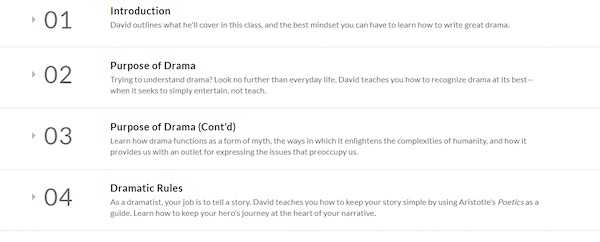
MasterClass clearly has its audience in mind when planning and recording each chapter. There is rarely a lesson longer than 20 minutes (a person’s average concentration length in one sitting) and it’s easy to dip in and out of lessons.
Active Community Hub
The Community Hub is a great way to discuss David’s lessons with others. This is akin to a seminar experience and is useful for those who learn best through discussion. MasterClass encourages its users to get involved and to ask any questions they might have.
The forum supports the Workbook assignments and allows users to get feedback on their work. MasterClass has a dedicated team that monitors the Hub, so you can be sure all information is clear and up to date.
Strong Workbook
The Workbook isn’t always my favourite part of the MasterClass experience.
But David’s Workbook excels in breaking down each chapter and offering ideas for further reading and assignments. One plus to having the online version is that you can follow the embedded links to relevant websites (as well as to the Community Hub).
It’s also helpful that the PDF includes notepaper for those who like their notes in one place. MasterClass has evidently taken a lot of time to perfect this PDF and match it up with the course content.
Accessibility
David’s MasterClass is currently available in English with subtitles for those that are hard-of-hearing. These captions are easy to follow and a far cry from the auto-generated subtitles some other websites use.
The Class Workbook is also a great component and offers another way of taking in the lessons. Most of the exercises and further viewing/reading is easily accessible and requires no further equipment.
What Could Be Improved
Mostly Play-Specific
As fascinating as David’s course is, it’s mostly geared towards those interested in playwriting. The rules of drama can be taken into other modes such as film and TV, but David talks almost exclusively about plays (and this is true for most of his case studies).
This is worth bearing in mind if you’re more interested in writing for film or TV.
Heavily Anecdotal with Fewer Visual Examples
IDavid’s MasterClass has a lot of anecdotes. These are a nice way of framing each lesson and grasping our attention, but I would’ve liked for them to be paired with some more visual examples.
There are no clips of any of David’s work (or anyone else’s for that matter), and the closest we get to a visual example is the chart David draws when discussing plot structure. For visual learners, this is one pitfall of the course.
Other MasterClasses, such as David Lynch’s, excel in this department. Lessons are structured with context, a screening, and further analysis. I think David Mamet’s hefty theory could’ve been improved with some more practical examples of how it physically works on stage.
More Theory than Practice
Similarly to my previous point, David’s teaching is mostly theoretical and even philosophical. Some of his lessons even border on the existential, and can seem a bit out of touch if you were expecting more concrete lessons in how to write.
Unlike other MasterClass I’d taken, the Workbook didn’t include any excerpts. It would’ve been helpful to have a physical example of how good writing appears on the page. If you compare this to Ron’s Howard’s MasterClass (which includes at least two scripts in their entirety) it’s clear to see how David’s class falls short.
Bias
This is true of most MasterClasses that cover creative topics. It’s very difficult to teach anything definitively, and it’s probably even frowned upon to do so. That being said, David is known for being an opinionated character. Aside from having a subjective way of writing, he also doesn’t shy away from voicing his religious or political views.
I could see how they might rub some viewers the wrong way. Most of his advice about writing also relates to his own Jewish background and his personal views on life. These can be hard to relate to from an individual standpoint and is a matter of opinion that doesn’t always translate well in the lesson.
Who is This Course For?
On a scale of 1-10 (1 being a novice and 10 being a seasoned writer), I would say this course is best suited for those between 5 and 7. This is because, despite its title, David’s class is more aimed at improving writing, rather than teaching you how to write.
It’s helpful to be aware of some literary theory and technical terms, as David assumes some foundational knowledge on behalf of his viewers. There’s certainly a lot to digest within this course, and David can cover a lot of theory quite quickly.
If you fit into this category, you can expect to learn how to do the following:
- Understand and craft an engaging plot
- Gain insight into literary and dramatic theory
- Utilize the 3-act structure in your work
- Create and transition strong scenes
- Improve your understanding of drama
- Write for your actors and audience
How much does the course cost?
Currently, MasterClass has three subscription offers. The price for these (per month) are:
- Individual (1 user): $10
- Duo (2 users): $15
- Family (6 users): $20
All are billed annually, which may seem a little pricey at first glance.
That being said, the value for money comes from taking as many courses as possible.
With 200+ courses on MasterClass, you’re bound to find many that interest you. But, even if you find that only 10% of the courses interest you, this still works out at $6 per course.
And, if you join with friends or family, the cost for each course is drastically reduced. Check out our MasterClass review or MasterClass cost articles to see how.
Bearing in mind that these courses are taught by leading experts, the value for money is unbeatable. Elsewhere, you can pay over $100 for a course taught by someone you’ve never heard of, and it would nowhere near match the caliber of teaching on MasterClass.
Besides, MasterClass offers a 30-day refund policy if you’re not happy with your purchase.
You can also purchase MasterClass as a gift.
Alternatives to David Mamet’s MasterClass
If you’re still unsure about whether this course is for you, here are some further writing courses that might take your fancy:
- Shonda Rhimes – Writing for Television
- Aaron Sorkin – Screenwriting
- Dan Brown – Writing Thrillers
- Malcolm Gladwell – Writing
- Amanda Gorman — Poetry
- Judy Blume – Writing
- James Patterson – Writing
- Margaret Atwood – Creative Writing
- Billy Collins – Reading and Writing Poetry
- David Baldacci – Mystery and Thriller Writing
- Neil Gaiman – The Art of Storytelling
- N. K. Jemisin – Fantasy and Science Fiction
- David Sedaris – Storytelling and Humor
- Joyce Carol Oates – The Art of the Short Story
- Walter Mosley – Fiction and Storytelling
- Salman Rushdie – Storytelling and Writing
- Amy Tan — Fiction Writing
Along with this, there are further categories in TV and film available on MasterClass’s “Categories” toolbar here.
Outside of MasterClass, it’s difficult to find a course that covers the same scope as David’s. Udemy offers a more general writing course and Faber Academy has several short courses dedicated to beginners’ writing.
With that in mind, I don’t think many online classes are as specific as this one. Nor do I think they rival MasterClass in terms of quality and production values. MasterClass has the benefit of having all of the course information in one place. Lessons are easy to navigate and you can stop and start any time you’d like.
David Mamet’s MasterClass: What Others Have Said
On MasterClass itself, most users have praised David’s class as being content-rich and highly informative. Most intended to re-watch the course in order to gain further insight into points they might have missed.
"He is clearly brilliant and conducted this class with great insight and great humour. I will be taking it again because there is so much to digest. Thanks, David." "Excellent class, will revisit, many lessons and inspiration." - Comments from the community
Most users found David likeable and informative, and the Hub is one of the most active I have seen on the website. That being said, I often use Reddit to research opinions before committing to a course. There, I found more mixed reviews.
"A friend of mine took it and said it was far from a ‘masterclass’. Mostly just generalities. Less useful than his book." "This is just my opinion, but Mamet’s MasterClass was just unbelievable. It’s so helpful and content rich. That closing…. That closing. I would definitely say it is one of the best, along with Neil Gaiman’s." - Comments from Reddit
There seemed to be two common arguments: 1) that David’s class was informative and valuable and 2) that there was nothing covered in the course that wasn’t already available online or in other books. This is a point I’ll consider below.
Is the course content unique?
As a few Reddit users have noted, David’s advice is based on a lot of ancient texts and established theories. He also has his own books, from which he summarizes some key points.
"With Mamet being a prolific essayist with On Directing, Three Uses of the Knife, and Bambi vs Godzilla, I feel like your wallet may be better served checking these books out unless you’re a learner that prefers video content." - Comment from Reddit
It’s certainly true that some of David’s lessons distil some complex and unoriginal theory. He also sums up some information that is more widely elaborated on in his books. That being said, many learn better by watching and listening rather than reading.
Because of this, I still think David Mamet's MasterClass is valuable and should stand in its own right. He takes some seemingly inaccessible content and presents it to us in a way that is easy to follow. While his essays are likely helpful for further reading, I do believe the course is useful in sparking out interest on the subject and encouraging us to think more deeply about drama.
What You Will Need
David’s MasterClass requires little to no equipment, save for a pen/paper and (if you’re like David) a typewriter. It’s also useful to have a printer if you’d like to annotate the Workbook. However, most of the class is self-contained and the resources are easily accessible on the Web.
Beyond the course, I think it’s helpful to check out some of David’s work. His film adaptations are more accessible than his plays (unless you’re able to find some recorded versions). His book of essays is also available on Amazon.
Is David Mamet’s MasterClass worth it?
In sum, yes. The course exceeded my expectations and covered a lot more ground than I was anticipating. As someone who enjoys theory, this class was in line with my preferences. However, if you’re looking for a more practical course, one user recommends Shonda Rhimes’s MasterClass as a good alternative.
Pros:
- Learn from an accomplished playwright
- In-depth teaching and engaging learning style
- Well-organized and easy-to-follow lesson plan
Cons:
- Mostly play-specific
- Theory-heavy
- Lacking in visual examples
In this MasterClass, you’ll learn how to:
- Understand and utilize the rules of drama
- Read and write great dialogue
- Distinguish between playwriting and other writing
- Overcome writers’ block to meet your goals
- Write for your actors and audience
- Craft engaging and logical scenes
A common concern amongst users was the price tag. $90 can seem steep for some and even entirely out of budget. If you’re seriously invested in playwriting, I would say the $90 is more than worth it.
But if you’re still on the fence, I would recommend watching other MasterClass trailers. You could even consider the all-access pass as a more worthwhile investment. This enables you to take unlimited courses according to your interests.
All in all, David’s course was strong in theory and content. I learned a lot about dramatic writing and the chapters gave a keen insight into how David creates each aspect of drama.
So, if playwriting is the direction you’re looking to take, David’s Masterclass is an invaluable resource to get you thinking and writing.
Frequently Asked Questions
A MasterClass all-access-pass costs $120 a year ($10 a month). This gives you access to David Mamet's MasterClass, alongside 200+ other courses.
There are 26 lessons totalling just under 5 hours of viewing time.
There is no way to access MasterClass free of charge. The closest alternative is if someone buys it for you.
Yes, MasterClass operates a 30 day refund policy.

Rebecca graduated from King's College university with a first class honours in English Language, followed by a Masters' Degree in Eighteenth Century Studies.



Write more, thats all I have to say. Literally, it seems as though you relied on the video to make your point. You definitely know what youre talking about, why throw away your intelligence on just posting videos to your weblog when you could be giving us something informative to read?
Thank you for your feedback! We truly appreciate your interest in more written content. While we aim to incorporate videos for a more engaging experience, we’ll certainly take your suggestion into account and work on providing more in-depth written insights as well. Stay tuned for more informative posts!
Thank you a lot for sharing this with all of us you actually understand what you are talking about! Bookmarked. Kindly additionally visit my web site =). We can have a link exchange agreement between us!
Thank you for your kind words! I really appreciate the support and that you found the content valuable. I’ll be sure to check out your website as well. A link exchange sounds like a great idea—feel free to share more details!
Looking forward to staying connected.
Best,